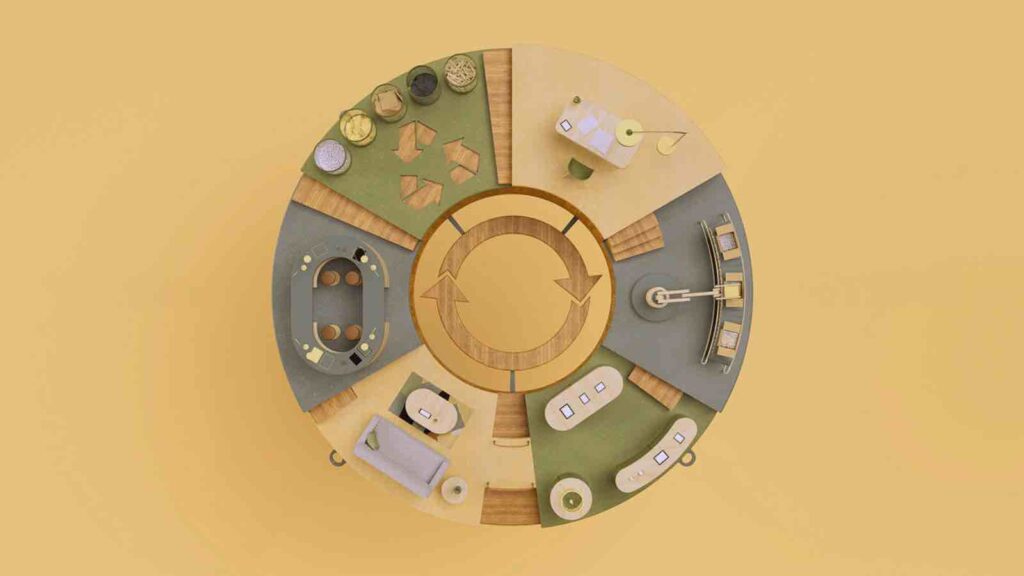Contrasting sharply with the entrenched linear model, which promptly discards products post-use, the circular economy champions a future devoid of waste. Once for all.
In today’s world grappling with environmental threats, The Circular Economy (TCE) emerges as a beacon of hope, challenging the status quo. Where our current economy extracts, produces, and disposes, TCE envisions a future without waste and with products designed for longevity. This ambitious model, though in infancy, promises transformative effects on both our economic framework and planetary stewardship.
RELEVANT SUSTAINABLE GOALS



The Circular Economy: Pivoting From Take-Make-Throw
The Circular Economy (TCE). Its principles weave through the fabric of societies worldwide, offering a vision starkly different from the prevalent ‘make, use, discard’ mentality. Here are its core tenets and how they are echoing around Asia and the world:
Zero waste ambitions : At the heart of TCE is the audacious goal of eradicating waste. From Japan’s meticulous waste-sorting rituals to South Korea’s rigorous recycling protocols, TCE champions designs that allow products to be continually reused, repaired, or recycled. Picture bamboo cutlery sets in Vietnam, meticulously crafted for repeated use, replacing disposable plastic
Harnessing the Power of Renewables: Across vast stretches of China’s Gobi Desert and the wind-swept terrains of Mongolia, TCE draws upon renewable energy sources like solar and wind, significantly diminishing the grip of fossil fuels. This shift not only counters climate change but also augments regional energy security.
Guardians of Cultural Heritage: From traditional Balinese textiles to hand-woven Filipino mats, TCE nurtures cultural preservation. By ensuring longevity in traditionally crafted products, it fosters a deeper connection between generations and their ancestral crafts.
Championing Biodiversity: Singapore’s urban green spaces exemplify TCE’s commitment to biodiversity. By minimizing the extraction of virgin materials and innovatively repurposing urban spaces, habitats for native flora and fauna are revitalized.
A New Business Horizon: Whether it’s an upcycled fashion brand in Bangkok or a refurbished electronics store in Seoul, TCE is unlocking fresh market vistas, incentivizing businesses to realign with eco-conscious principles.
Reimagining Water Conservation: From India’s ancient stepwells to modern rainwater harvesting techniques in Malaysia, TCE underscores sustainable water management. The focus is on minimizing freshwater wastage and pioneering methods to treat and repurpose wastewater.
A Consumer-Centric Shift: Scandinavians, with their penchant for minimalistic and durable design, exemplify the benefits TCE brings to consumers: high-quality, lasting products that don’t strain the wallet or the Earth.
Prioritizing Health and Well-being: TCE is not just an economic doctrine; it’s a lifestyle. Clean air in the Bhutanese valleys, pure water in Finnish lakes, and organic produce in Nepali highlands illustrate a world where well-being is intertwined with sustainability. It’s about a holistic environment where clean air, pure water, and fresh food aren’t luxuries but norms.
Celebrating Recycled Materials: Across Europe, recycled materials are not just waste – they are assets. TCE propels this ideology, advocating for materials to be in circulation, thereby curtailing pollution and conserving our planet’s finite resources.
Though nuanced and multifaceted, TCE presents a compelling solution to our contemporary challenges. It’s more than a model; it’s a movement, nudging us toward a symbiotic existence with our cherished planet.



